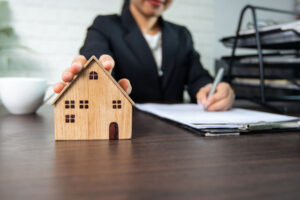There are many reasons why properties are cheap in France. The country is known for its beautiful landscapes, rich culture and amazing food.
The prices of property in France have been decreasing as the country has been experiencing a housing crisis. This has also resulted in a rise of foreign buyers who are looking for cheaper property to buy.
France is one of the few European countries that does not have a capital gains tax on residential properties. This makes France an attractive place to buy property as it offers more security than other countries.
The French government has relaxed its laws on foreign ownership of property, making it easier for foreigners to buy homes in France.
This has led to a boom in the housing market, with prices dropping as demand increases.
It’s a great time for those looking to buy their dream home here!

How the Market Impacts the Pricing of Properties in France
France is the second most visited country in the world, with 83 million foreign tourists in 2017. The tourism industry is one of the main drivers of France’s GDP and has a major impact on the housing market.
The demand for property in France has been steadily increasing, especially for vacation homes. In 2016, prices increased by 2.3% year-on-year to €1,000 per square meter for new properties and by 1% to €1,200 per square meter for existing properties (source: ilex-immobilier).
There are several factors that have impacted this increase, such as low-interest rates and high demand from foreign buyers.
Costs Related to Buying Real Estate in France
Area
There’s no doubt that property prices vary depending on where you are – the sky-high price of a Paris apartment costs an average of €10,000 per square metre, which puts the capital out of reach for everyone except the wealthiest buyers; the French Riviera is a popular tourist hotspot too.
Rural areas like Lozère, Corrèze and Creuse tend to be the cheapest places to live in France. Nonetheless, you need to be wary of moving there just because it’s cheap – rural France is often very remote with very little nearby in the way of public services, public transport, hospitals, and even neighbours.
It may seem like a dream to some, but be sure you can tolerate this level of isolation in the event of an illness, for example.
Agent
For finding a home, you might have to pay a fee if you aren’t making a private sale with someone you know.
In most cases, the fee for the agent is paid by the buyer of the house, but depending on the contract, look for honoraires à la charge de l’acquéreur in the house advert, which indicates that the buyer pays the fee. A property listing should include two prices – one with and one without additional fees and charges.
Notaire
A Notaire fee is still required, even if you are conducting a private sale. Tens of thousands of euros may be required.
Foreign buyers often have trouble understanding the role of the Notaire. They do not represent them as lawyers do in other countries, but they can offer legal advice if asked. They register the sale in the French land register on behalf of the state.
In order to avoid paying the fee, which is a percentage of the selling price, there is no way to avoid registration by a Notaire.
In reality, it’s more like a house tax or stamp duty since it’s called a notary fee, but the Notaire only keeps a small portion.
Renovation costs
You should also consider how much renovation an older property requires if you are considering buying it. France has many older properties on its market because inheritance laws mean that many siblings inherit family properties, and they prefer to keep their own, newer, lower-maintenance properties and sell the old family home.
Foreign buyers are drawn to these historic properties because many of them are beautiful and atmospheric, and they deserve a loving upgrade. However, many French buyers will not even look at them because they are aware of the renovation costs.
As with any renovation project, the price depends on what needs to be done, but in general, you can expect to pay more for tradesmen in France than in other places, and some products like paint are more expensive too, so do your homework before beginning a renovation project.

Taxes
Whether you live in your new place full-time or not, after you buy it, you’ll need to pay taxes on it.
It is the householder who pays the taxe d’habitation, while the owner pays the taxe foncière. The homeowner pays both taxes.
Due to the phasing out process, the habitation tax currently only applies to those with higher incomes, but second home owners still pay it regardless of income.
As a matter of fact, in some areas, the tax foncière has been substantially raised to compensate for the lost revenue from taxe d’habitation. If you want a rough idea of what to expect, ask what the neighbours pay to give you an idea of what to expect.
Also, you must pay a TV licence fee, regardless of whether you watch French television, and sometimes a local waste collection fee, depending on the commune.
Utilities and insurance
In most cases, utilities and insurance will already be factored into your calculation, but utility costs might be higher than you expected. There is no way to save money by switching between electricity and gas companies regularly (check out The Local’s What Changes series for each month’s prices), and prices are not regulated statewide.
Rental income
Renting out a second home while you are not living in it might be an option for people buying a second home as a second home.
Even though many people do succeed in doing so, you should note that there are some complicated rules, and you need to register your property with local authorities.
In addition to making an annual tax declaration in France, even if you don’t live here full-time, if you make money from a rental in France, you will also need to start making a tax declaration every year.
Conclusion: What Factors Make French Property Such a Great Investment?

France is one of the most popular tourist destinations in the world. It also has an excellent higher education system and a great healthcare system.
The French property market is very stable, and it’s not as expensive as in other European countries.
Property prices are still low compared to other European countries, which makes it a great investment opportunity.
French property can be bought with a mortgage from your local bank, which means you don’t have to pay all of the money upfront.
Frequently Asked Questions
Why renting is a better investment in France compared to buying and owning?
France is a country with a high cost of living. The cost of buying and owning, on the other hand, is much lower.
The thing is that the rental market in France is more competitive than it’s ever been before. This means that renters have more choices, and they can find better deals when renting property.
Renting in France has become so popular because it’s cheaper than buying or owning property in France.
What is it like to live in France?
France is a beautiful country with a rich culture and history. It has many natural wonders, such as the Alps, the Pyrenees, and the Atlantic coast. It has some of the best wines in the world, delicious cheese, and fine cuisine.
The country has been shaped by its various cultural influences – Roman, Frankish, Celtic, Germanic-Lombardian (i.e., Burgundian), Viking (i.e., Norman), Byzantine (i.e., Provençal) – to create a unique cultural identity that is as old as it is modern.
There are many things to do in France: from skiing in the Alps to relaxing on one of their gorgeous beaches along the Atlantic coast; experiencing the best French cuisine to sampling the local wines or even picking up a new language in their many schools. They also have some unique traditions, such as eating snails and oysters on New Year’s Eve and chasing a live rooster with sticks on Pâques.
What is the average cost of a house in France?
The average price of a house in France is about €200,000.
France is the most populous country in Western Europe and the European Union. The country has an area of 643,801 square kilometres and a population of 66 million people. It has a very diverse landscape with mountains, plains, rivers and forests.






